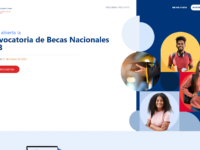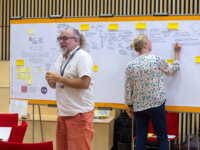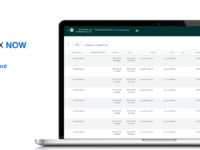The Idarathon competition is a response to the imminent need for agility and resilience in the Moroccan administration. The name of the competition is a contraction of the terms 'idara', meaning administration, and marathon, a competition in which civil servants are challenged to innovate. During this competition, a number of challenges are identified and form the basis of the process of ideating and prototyping solutions to meet them.
Innovation Tag: Challenges and Awards
Innova FOSIS created a new way of designing public policies that opened up public problems to solutions from civil society, the private sector, and academia. It allows a space within the state to test solutions on a small scale, through the implementation of learning pilots. It is an open innovation competition, followed by a pilot model for learning management and finally a mechanism for scaling up the best solutions to public policy.
The Intergovernmental Network and Competition for regulatory reform was designed to provide a driving force for regulatory reform and for mutual learning between local governments. It moves away from existing top-down regulatory innovation and rather motivates bottom-up regulatory reform policy, enables mutual learning of best practices, and allows local governments to benefit. Also, the final beneficiaries of the Network are citizens and businesses, as when regulatory innovation increases, so…
In order to solve the problem of waste accumulation in the city of Nablus, an application was created for drivers of cars affiliated with the Solid Waste Department of Palestine. Many areas in Palestine face the challenge of accumulation of waste in commercial areas, which affects citizens who use the area, and causes traffic congestion during the waste collection process due to the lack of specific paths that take into account the shortest road, priority streets, and waste collection times. The…
The Unique Scholarship Portal (Portal Único de Becas “Beca tu Futuro”) is a web platform that aims to concentrate all scholarship opportunities in a single portal. In this way, it documents and manages everything from the publication of the call for applications to the awarding of scholarships. The portal benefits all the citizens of the Dominican Republic who wish to apply for a scholarship. Moreover, the portal serves as a management tool for the scholarships' evaluators and the…
The Local Wealth Building Challenge Fund is designed to provide financial and non-financial support to develop new products and services to tackle challenges. One aspect of this Challenge Fund which is unusual is the focus on developing innovations that will be procured by the challenge holder, providing additional incentives and focus. Public and third sector organizations often have issues that can be solved not by getting new skills or more workers, but by being innovative. The Challenge…
Brazilian Challenges Platform (PLataforma Desafios) is an initiative of the Government Innovation Division, GNova, of the National School of Public Administration (Enap), which offers help to public managers to innovate together with society, taking advantage of collective intelligence to reduce the insecurities of the innovation process and increase the chances of success. The Challenges Platform recognises, rewards and disseminates innovative solutions, through a process similar to…
Case Study
Voluntary Removal of Regulatory Barriers to Competition: Using Social Norms to Nudge Government…

INDECOPI has implemented a new project called “Voluntary Removal of Regulatory Barriers to Competition” based on the use of social norms in official documents and data dashboards to monitor the removal of bureaucratic barriers across the country. Through this, civil servants compare their performance in eliminating barriers with their peers and adapt their behavior towards high-quality regulation.
First platform in the industry which support standalone and integrated workflow solution for any inspection,which leads to increased efficiency,security,and accuracy of inspection operations through virtual-inspection capability that enables the inspection teams to work remotely and reduce the need for field visits and addresses some pain points which includes inconsistency in quality,time consumption and resource management.stakeholders include Inspectors, Schedulers ,System admin,inspected org
Nova Scotia has 21 Community Transportation Operators serving mainly vulnerable populations in rural areas. The CTOs were unable to feasibly procure a common dispatch and scheduling solution that met their needs, leaving them with inefficiencies and inability to meet growing needs. The Outpost for Public Sector Innovation designed a new approach to co-designing and procuring solutions to complex challenges. Together with stakeholders, partners and vendors, two viable solutions were developed.





